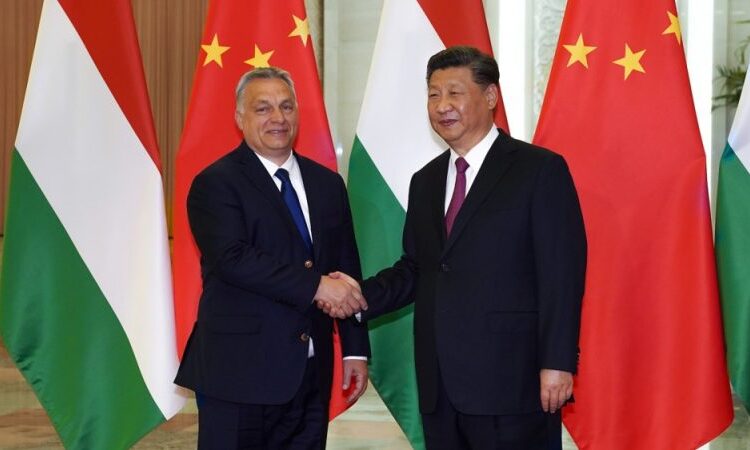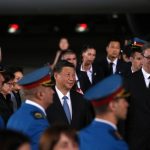
On the last leg of his European tour in Hungary, Chinese President Xi Jinping on Wednesday (8 May) is expected to tighten ties with Budapest, its closest ally in the European Union.
After Paris, Xi’s visits to Belgrade and now Budapest are significantly less politically sensitive for China with both countries sharing, sharing Beijing’s wariness of a US-dominated global order.
Xi’s visit to Hungary will also be an attempt to reverse the increasingly souring attitudes of Eastern European countries towards Beijing after its diplomatic push in the region faced a diplomatic hit in recent years.
Seen from Beijing, Budapest in the next months could play a bridging role between China and Europe.
China’s ambassador to Hungary, Gong Tao, said that “Beijing expects from the Hungarian EU Presidency that the Hungarian side will pursue a rational and pragmatic policy towards China and will encourage other EU countries to do the same.”
Hungary’s Prime Minister Viktor Orbán, meanwhile, wants to use the visit from Beijing as a counterweight to the pressure from Brussels. Since coming into office, he has steadily pushed for an ‘Eastern opening’ in the country’s foreign policy.
In 2015, Hungary was the first EU member to join China’s new ‘Silk Road’ project, making it an important trade and transport gateway for Beijing into Europe.
Last October, Orbán attended a summit for Xi’s Belt and Road Initiative (BRI) in Beijing while all other European counterparts stayed away, and Italy withdrew from the format shortly after.
As part of the BRI initiative, Chinese loans are financing an expansion of a railway connection between Hungary and Serbia to create a connection to the Greek port of Piraeus, which is majority-owned by the Chinese shipping company Cosco.
EVs centre stage
Xi will also use the visit to announce further investments, which come at the right time for Hungary as Budapest’s economy has been missing out on blocked EU funds over rule of law violations.
While China brought the most foreign direct investment (FDI) to Hungary in 2020 and 2023, Chinese companies continue to invest in Hungary on a large scale.
In January, the world’s largest electric vehicle producer, Chinese-owned BYD, announced that it would establish its first European production facility in the south of Hungary in addition to its electric bus manufacturing site, which opened in 2016.
The relationship between BYD and Hungary will likely be driven by economic rather than geopolitical considerations. Several Chinese electric vehicles have expressed an interest in manufacturing in Europe to better understand the European market and to bypass trade tariffs. Japanese car makers pursued a similar strategy in Europe in the 1980s.
Other Chinese manufacturers plan to build factories in Spain, the UK, and Poland.
The disruptive shift to electric cars has given upstart Chinese producers an opportunity to enter the lucrative car manufacturing sector when European car makers are struggling to compete with their own electric-based offerings.
The European Commission has launched a high-profile probe into Chinese electric vehicle producers. If the investigation concludes that these companies received unfair support from their government, the EU could slap extra tariffs on Chinese cars imported into the bloc.
Such tariffs may not be sufficient to protect Europe’s carmakers, however. A recent study concluded that China’s manufacturers enjoy such a cost advantage over their European rivals that a 50% tariff would be needed to deter Chinese car imports.
European governments may, therefore, be more receptive to Chinese production on their territory, in light of the competitive weakness of their domestic carmakers.
‘Pro-peace camp’
Beyond trade and investment, Russia’s war in Ukraine and China’s peace plan blueprint are expected to be other high-profile items on the agenda.
Hungary’s Foreign Minister Péter Szijjártó said Budapest welcomes Beijing’s peace plan proposal “first of all because it exists and also because it is about peace”, adding that, “China is unquestionably one of the strongest states in the pro-peace camp that keeps emphasising the importance of peace.”
“There is full consensus between us on this matter, which is why the possibility of creating peace will be an important topic on the agenda of talks,” he said
[Edited by Alice Taylor]







